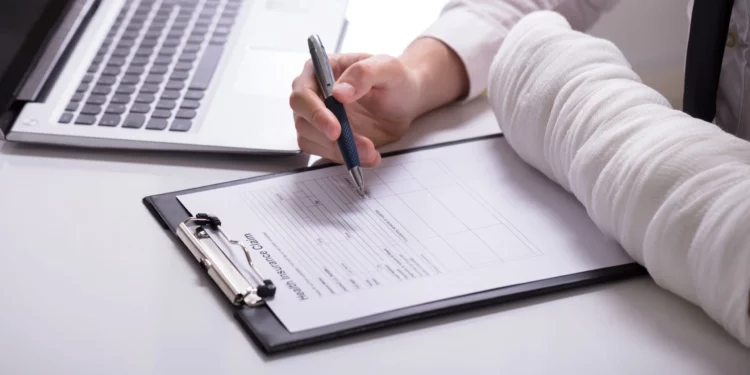The necessary documents are crucial when filing a total and permanent disability claim. A total and permanent disability claim refers to a request for benefits based on a severe and lasting impairment that renders an individual unable to work. The process involves providing evidence to support the claim, highlighting the need to gather relevant documents. These documents prove the disability, its impact on daily life and employability, and the individual’s financial situation. Here is how to gather documents for a total and permanent
Medical Records and Reports
One of the most crucial types of documentation for a total and permanent disability claim is your medical records and reports. These documents validate the existence and severity of your disability. Here are some steps to gather them:
- Obtain medical records from healthcare providers: Contact your primary care physician, specialists, and any other medical professionals involved in diagnosing and treating your disability. Request copies of all relevant medical records, including clinic notes, test results, surgical reports, and treatment plans.
- Gather diagnostic tests and imaging results: Include any X-rays, MRIs, CT scans, or other diagnostic tests that support your disability claim. These documents can provide objective evidence of your condition.
- Include physician statements and opinions: Request written statements from your healthcare providers describing your disability, its prognosis, and the limitations it imposes on your ability to work or perform daily activities. These statements can be influential in establishing the severity of your condition.
Employment and Income Documentation
To demonstrate the impact of your disability on your employment and income, gather the following documents:
- Employment records and history: Collect employment records, including job descriptions, performance evaluations, and any accommodation requests related to your disability. These records help establish your work history and provide context for your disability claim.
- Income statements and tax returns: Include recent income statements, such as pay stubs or profit and loss statements if you are self-employed. Additionally, provide copies of your tax returns to demonstrate your income level before and after the onset of your disability.
- Relevant Social Security Administration (SSA) records: If you have previously applied for or received any Social Security benefits, include documentation of those applications, decisions, or appeals. These records can provide additional support for your claim.
Proof of Disability
In addition to medical records, you need to gather specific documents that prove the existence and severity of your disability:
- Disability determination letters or reports: If you have received disability determinations from government agencies, include these documents. They serve as official recognition of your disability.
- Vocational evaluations or assessments: If available, include vocational evaluations or assessments conducted by professionals. These reports assess your ability to perform work-related tasks and provide expert opinions on your employability.
Personal Statements and Affidavits
Your statement and affidavits from individuals who can attest to your disability can be powerful evidence. Follow these steps to gather these documents:
- Write a detailed personal statement: Prepare a comprehensive personal statement describing your disability, its symptoms, how it affects your daily life and work, and any treatment or therapies you have undergone. Be specific about the limitations you experience and provide examples.
- Collect affidavits from family, friends, or colleagues: Request affidavits from individuals with firsthand knowledge of your disability and its impact. They can provide additional insight into your condition and how it actually affects your ability to function.
- Include letters of support or testimonials: If you have received letters of support or testimonials from healthcare professionals, community leaders, or coworkers, include them. These letters can further strengthen your claim.
Legal and Financial Documents
Certain legal and financial documents can support your total and permanent disability claim. Consider the following:
- Court judgments or settlements: If you have received any court judgments or settlements related to your disability, include documentation of these legal proceedings. They can provide evidence of the seriousness of your condition.
- Disability insurance policies: If you have any disability insurance policies, gather the relevant documents. These policies may offer coverage or benefits that support your claim.
- Financial records: Gather financial records, such as bank statements, mortgage statements, or utility bills, to demonstrate any economic hardships resulting from your disability. These records can help establish the financial impact of your condition.
Expert Opinions and Evaluations
Obtaining expert opinions and evaluations can further strengthen your disability claim. Consider the following steps:
- Seek evaluations from specialists or experts: Consult with specialists in the relevant field of medicine to obtain expert evaluations of your disability. These evaluations can provide additional professional support for your claim.
- Include expert opinions on employability: If an expert has assessed your ability to work or provided an opinion on your employability, include their report or statement. These opinions carry weight in demonstrating the impact of your disability on your ability to get to earn a living.
Conclusion
Gathering the necessary documents for a total and permanent disability claim is paramount. Thorough documentation plays a crucial role in establishing the validity and severity of your disability, its impact on your daily life and employability, and your financial situation. Ensuring you have comprehensive and well-organised evidence enhances your chances of a successful claim. If you find the process overwhelming or need guidance, don’t hesitate to seek professional advice or assistance. Disability attorneys or advocates can provide valuable expertise and ensure you gather all the necessary documents and present your case effectively. Remember, professional support can make a significant difference in the success of your claim.
Overall, by emphasising the importance of thorough documentation, summarising the key steps, and encouraging seeking professional assistance if needed, you can navigate the process of gathering documents for a total and permanent disability claim with confidence.
Also, Read: Discover the Tranquil Escape at 34.354.268 Ltda Park Hotel Boa Idade in Recife

















